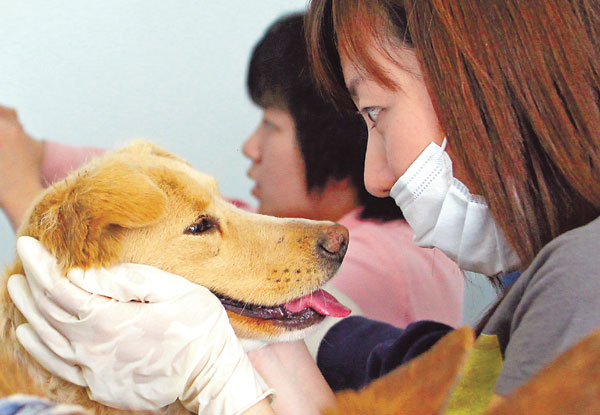Photos
Dog rescue sparks pet law debate
Updated: 2011-04-19 09:00
By Liu Yujie (China Daily)
Animal lovers react after shipment is halted on Beijing expressway

A Beijing animal lover who stopped a shipment of dogs on their way to hotpot restaurants in North China has told METRO how he acted in the heat of the moment.
An Lidong, who works for a foreign-owned company, attracted the help of at least 200 netizens last Friday when he blocked the truck carrying the animals at an expressway toll booth in Tongzhou district.
"I was driving home and the idea just struck me," he said in a phone interview on Monday. "I'd known there were trucks transporting dogs on the Jingha Expressway for a long time. Luckily, that day, I saw a shipment. I turned on my lights and I managed to stop the truck; then I posted the news on my micro blog."
Animal rights campaigners flocked to his aid and staged a 15-hour standoff. After negotiations, the logistics company agreed to release the dogs in exchange for 115,000 yuan put up by the Lee Pet Vet animal hospital and Shangshan Foundation, an animal rights charity.
"It was one of the people who arrived that suggested we take the dogs to the China Small Animal Protection Association (CSAPA) shelter," added An.
Instead of heading to dinner tables in Jilin province, most of the 460 dogs were instead transferred to the association's Beianhe base in Haidian district. The worst injured were sent to animal hospitals across the capital, while at least 10 were already dead.
The incident has sparked a nationwide debate over the consumption of dog meat, with campaigners quick to point out that, although many pets were saved from the plate last week, many more are no so lucky.
"We saved a truck of lives, but the sad fact is this keeps happening every day," said Lu Di, 80, director and founder of CSAPA. "Since last Friday, there have been already been two more shipments of dogs by the same route. We feel powerless to help those all poor creatures."
Almost all of the animals rescued were suffering dehydration, malnutrition or infectious diseases. One had fractures to all four legs, while another even had pneumonia.
Roughly 30 percent of the dogs are expensive breeds with nametags and bells, while the majority are tame, which means they are likely stolen family pets, added Lu, a retired biologist at Remin University of China.
"It is time to show our attitude and determination, and we hope the government will take the incident seriously and quicken the legislation of small animal protection laws," she said. "It's more than 100 years since Britain passed the world's first animal protection law in 1888, but China still has no such laws.
"A friend of mine from Britain was so shocked to learn that golden retrievers and huskies are eaten in China because they can be ideal guide dogs. There are much more restaurants in Beijing selling dog meat than eight years ago. We frequently talk about building a civilized society, so shouldn't we quit this inhumane habit first?"
Helping hands
Volunteers from across Beijing have been running between the CSAPA shelter and various hospitals to nurse the injured dogs, helping veterinarians to feed them medicine and to rub balm into their sores.
"All of the dogs need to be vaccinated and we've been giving the dogs injections all morning," said Xu Hongqian, a trainee vet from China Agriculture University.
Freelance writer Wang Shuji, 26, and her mother took one day off work on Monday to help donate food and cages to the Beianhe animal base.
"We have been anxiously waiting for an (animal protection) law for more than 10 years," said Wang. "I hope those dog hunters, carriers and eaters can truly reflect on what they're doing. Only when the government acts will miseries like this be prevented."
The CSAPA is now soliciting donations to pay for the sterilization of the rescued animals, although staff said that their online service is currently experiencing difficulties.
"We need more volunteers to keep each dog accompanied as most of them have been terrified and need intimate care," said Zhang Xiaofei, head of the shelter's volunteers program, during a short interval between phone calls.
"It's not safe to eat dogs because there is no inspection standards on raising non-poultry animals like dogs and cats," she added.
The rescued dogs will be put up for adoption, although many of them are taller than 35 cm, which means under Beijing regulations they cannot be kept as pets within the capital's Fifth Ring Road.
Wang Wei contributed to this story.
China Daily
(China Daily 04/19/2011 page33)
Specials

In the swim
Out of every 10 swimsuits in the world, seven are made in China.

Big spenders
Travelers spend more on shopping than food, hotels, other expenses

Rise in super rich
Rising property prices and a fast-growing economy have been the key drivers.